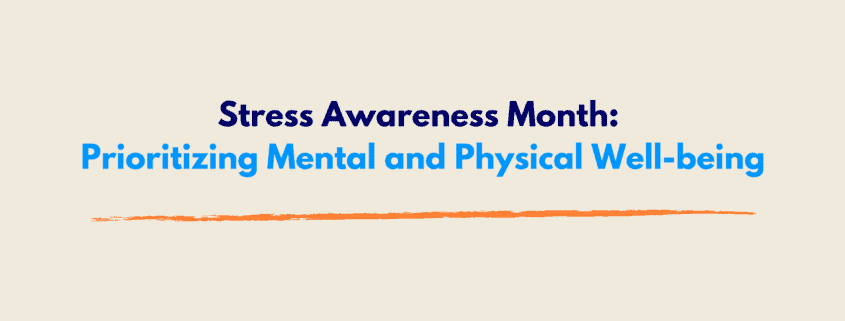
Stress Awareness Month: Prioritizing Mental and Physical Well-being
April is Stress Awareness Month and serves to shine a light on the silent yet pervasive force affecting millions worldwide. Stress has become an almost inevitable aspect of life in our fast-paced, modern society. From the demands of work and family to societal pressures and personal expectations, the sources of stress can feel endless. Amidst the hustle and bustle of daily life, it’s crucial to recognize the profound impact that stress can have on both mental and physical health.
Understanding Stress
Stress is not inherently negative; it’s a natural response designed to help us navigate challenging situations. However, chronic stress, the persistent state of feeling overwhelmed, can wreak havoc on our well-being if left unchecked. Research has shown that prolonged exposure to stress hormones like cortisol can lead to a host of health issues, including anxiety, depression, high blood pressure, heart disease, obesity, and weakened immune function. Therefore, acknowledging and managing stress is not merely a luxury but a necessity for maintaining a healthy mind and body.
Understanding the connection between stress and health emphasizes the importance of actively managing our stressors. Fortunately, there are some simple strategies and techniques that can help you to manage stress.
Managing Stress
Self-awareness is key. Recognizing the signs and symptoms of stress is the initial step toward effective management. These symptoms may vary from person to person but can include irritability, fatigue, changes in appetite or sleep patterns, and feeling overwhelmed or anxious. By tuning into these signals, we can intervene early and implement coping mechanisms before stress spirals out of control.
Meditation
One powerful tool for managing stress is mindfulness meditation. This practice involves practicing awareness and non-judgmental acceptance of one’s thoughts and feelings. Research has demonstrated that regular meditation can reduce stress, lower cortisol levels, and enhance overall well-being. Simple mindfulness exercises, such as focused breathing, can be incorporated into daily routines to promote relaxation and mental clarity.
Exercise
Physical activity is another effective stress manager. Exercise releases endorphins, the body’s natural stress relievers, improves mood, boosts self-esteem, and promotes better sleep—all of which are instrumental in combating stress. Whether it’s a brisk walk, yoga session, or weightlifting workout, finding an enjoyable form of exercise can significantly alleviate stress and enhance resilience.
Social Support
In addition to individual practices, social support is crucial in stress management. Connecting with friends, family, or support groups can provide a sense of belonging and validation, reducing feelings of isolation and bolstering coping mechanisms. Talking about one’s stressors with a trusted friend or family member can offer perspective and emotional relief. Moreover, offering support to others in times of need fosters trust and strengthens social bonds.
Healthy Habits
Adopting healthy lifestyle habits can improve the body’s resilience to stress. Prioritizing adequate sleep, maintaining a balanced diet, and limiting stimulants like caffeine and alcohol can optimize physical health and bolster the body’s ability to cope with stressors.
Reach Out
While these strategies can be effective in managing day-to-day stressors, seeking professional help may be necessary for individuals struggling with chronic or severe stress. Therapists, counselors, or other mental health professionals can provide personalized support and evidence-based interventions to address underlying issues and develop coping skills tailored to individual needs.
As Stress Awareness Month reminds us, acknowledging and addressing stress is not a sign of weakness but a testament to our commitment to self-care and well-being. By cultivating self-awareness, engaging in mindfulness practices, nurturing social connections, prioritizing physical health, and seeking professional support, we can empower ourselves to navigate life’s challenges with resilience.
If you’re struggling, Oasis TMS is here to help. Give us a call at (888) 417-5973 or visit https://oasistms.com/journey-towards-healing/ to learn more about if TMS therapy is right for you.
Leave a Reply
Want to join the discussion?Feel free to contribute!